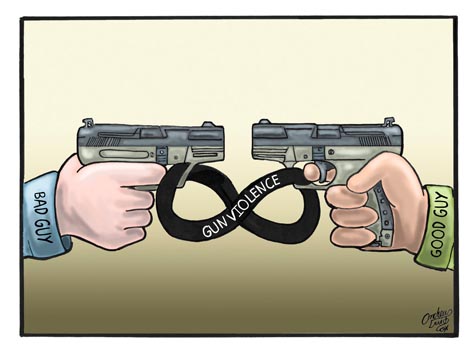Gun Control “Triggers” Debate
For decades now, gun control has triggered (no pun intended) intense bipartisan debate between American liberals and conservatives. With liberals typically pushing for stricter gun laws and conservatives quick to fervidly defend Second Amendment rights, gun control is considered one of the most remarkably divisive political matters in the United States today. But what does it really mean, and why is it such a sore topic?
What does “gun control” mean?
To begin with, “gun control” is a general term that refers to governmental restrictions placed on the manufacture, sale, and possession of firearms. Such restrictions may address questions like what types of rifles can be sold or purchased, who can sell or purchase them, and how a dealer should vet a buyer, how transactions are reported to the government and under what circumstances, and where and how owners can store their firearms.
How does the United States regulate guns?
Federal law forbids the ownership of a firearm by a convicted criminal, a person with a history of mental illness, a drug addict, an undocumented immigrant, a veteran dishonorably discharged from the military, or any person with a court order keeping them away from an ex-partner or ex-partner’s children. Dealers are obligated to conduct background checks to determine whether a potential buyer meets the required legal criteria.
Gun control laws exist more intensively at the state level. Most states require a permit or license to carry a concealed firearm, and do not require a permit for legal gun owners to carry their firearms in public.
How do Americans generally feel about gun control?
According to a poll conducted by the Pew Research Center in August 2015, 50 percent of American respondents believed the U.S. should focus more heavily on restricting gun ownership, while 47 percent claimed it is more important to protect the right of Americans to own guns. Unsurprisingly, this nearly-equal divide is mimicked in real life U.S. politics.
The same poll found that 79 percent of Americans agree with developing restrictions to prevent citizens with a history of mental illness from purchasing guns, 70 percent support the establishment of a federal database to track all gun sales, and 57 percent support completely banning assault rifles. Of that initial 79 percent, 81 percent of respondents were Republicans and 79 percent Democrats. However, only 55 percent of Republicans favored the creation of a federal database compared with 85 percent of Democrats; and only 48 percent of Republican respondents supported banning assault-style weapons as opposed to 70 percent of Democrats.
What sparks this debate?
A report conducted by the Congressional Research Service found that roughly two-thirds of all mass murders in the U.S. are committed using firearms. At least 317 mass shootings, defined by the FBI as “a multiple homicide incident in which four or more victims are murdered with firearms, within one event, and in one or more locations in close proximity,” have been committed in the U.S. from 1999-2013, injuring 441 victims and killing 1,554. The report also shows that both the prevalence and fatality rate of mass shootings rose sharply from 2007-2013.
Additionally, research by the University of Alabama Department of Criminal Justice found that even though the U.S. represents less than five percent of the global population, Americans accounted for 31 percent of global mass shooters from 1966 to 2012, more than any other country in the world.
With these statistics, liberals propose to ban firearms, claiming that mass shootings will quickly become easier to execute if citizens have an easy access to guns. In contrast, conservatives argue that guns can be used as a self-defense mechanism, and that mass shooters will be more discouraged if citizens have the means to defend themselves. In particular, they say that an armed citizen can stop a mass shooter. Social scientists insist there is no reliable research one way or another, proving that the debate sprouts purely from opinion.
Furthermore, different political groups interpret the Second Amendment of the Constitution, which reads, “A well regulated militia, being necessary to the security of a free state, the right of the people to keep and bear arms, shall not be infringed.” Gun owners allege that “the right of the people to keep and bear arms” is an individual right, while gun control advocates contend that it is a collective right of the people, through a militia. In 2008, the U.S. Supreme Court confirmed the conservative argument in a 5-4 ruling, indicating that the Second Amendment protects an individual’s right to own and operate a firearm for self-defense purposes, and thus rejecting the more liberal reasoning of a collective right.
What are the arguments for stricter gun control laws?
Gun control advocates are characteristically distrustful of America’s gun laws. They favor banning assault rifles, and placing more restrictions on who should legally be able to purchase guns.
From their point of view, the system contains three rather evident loopholes due to how weakly it is enforced at the federal level. One is the so-called notorious “gun show loophole,” which excuses dealers who do business at gun shows from having to conduct background checks on the people they sell to.
Another concern pertains to the permeable nature of the mental health requirements. The law explicitly bars firearm possession by a citizen declared a “mental defective” by some judicial authority. However, the issue presented with this constraint is that most people with a serious mental ailment never truly receive such arbitration, and those who do may petition to have the decision reversed.
Furthermore, a December 2015 New York Times article shows that most guns used in recent mass shootings, including firearms used in the San Bernardino attack, were obtained legally, even though at least eight gunmen had criminal histories or documented mental health issues.
“I believe it is necessary for our society to function with gun control,” junior Isabel Oberlender said. “Even though countries can function without gun control, it doesn’t mean that Americans should be held to the same standard because based on recent events, apparently we cannot.”
A concern that has been voiced more recently, notably by President Barack Obama, is the fact that persons on the federal government’s “No Fly List,” a blacklist maintained by the Terrorist Screening Center naming suspected terrorists, are permitted to obtain guns legally.
“Congress should act to make sure no one on a no-fly list is able to buy a gun,” President Barack Obama said during his Oval Office speech on December 6. “What could possibly be the argument for allowing a terrorist suspect to buy a semi-automatic weapon?”
What are the arguments for more sheltered gun rights?
Gun rights advocates form an incredible political lobby, led by the National Rifle Association (NRA), a social welfare organization. According to chief executive Wayne LaPierre, the NRA is backed by at least two million “active and interested” members.
Conservatives are typically against stricter gun control, and instead passionately support the right of American citizens to keep firearms for self defense, hunting, or simply because they can. However, some favor more restrictions to keep those with mental illnesses from gaining access to firearms.
“I’m against gun control, but I feel like there has to be more restrictions on purchasing guns,” sophomore Damian Szlachta said. “In my opinion, there should be more tests and background checks than there already is.”
In the wake of recent public mass shootings motivated by ISIS beliefs, Republican presidential candidates have voiced their preference to focus attention on strengthening national security as opposed to gun control regulations.
“When you look at Paris―you know, the toughest gun laws in the world, Paris―nobody had guns but the bad guys,” Republican presidential candidate Donald Trump said at a rally in Beaumont, Texas. “You can say what you want, but if…our people had guns…it would’ve been a much, much different situation.”
Additionally, some conservatives are against the liberal initiative to ban No Fly List members from obtaining firearms. This is mainly due to how vague and loosely defined the criteria is to end up on such a terrorist watch list. According to a report published by The Intercept, “irrefutable evidence or concrete facts are not necessary” to articulate reasonable suspicion. The report also implies that the government may opt to add a citizen to the list if they are “nominated” by a credible source. Therefore, the list could not always be entirely accurate, and thus conservatives fear banning No Fly List affiliates from legally purchasing guns could infringe on the liberties of innocent Americans caught in a flawed system.
How does the modern debate impact public policy?
Senate lawmakers in early December rejected one bill proposing more background checks for online firearm purchases and gun show purchases, as well as another bill that would have made it more difficult for citizens on the No Fly List from purchasing guns. In response, President Obama plans to finalize an executive order that will expand background checks and close the gun show loophole. Realistically, the debate is likely to continue being as heated and closely divided as it is now.

Senior Sarah Trebicka is a four-year staff reporter and former two-year Our World editor, now serving as editor-in-chief for the Spotlight. In addition...


